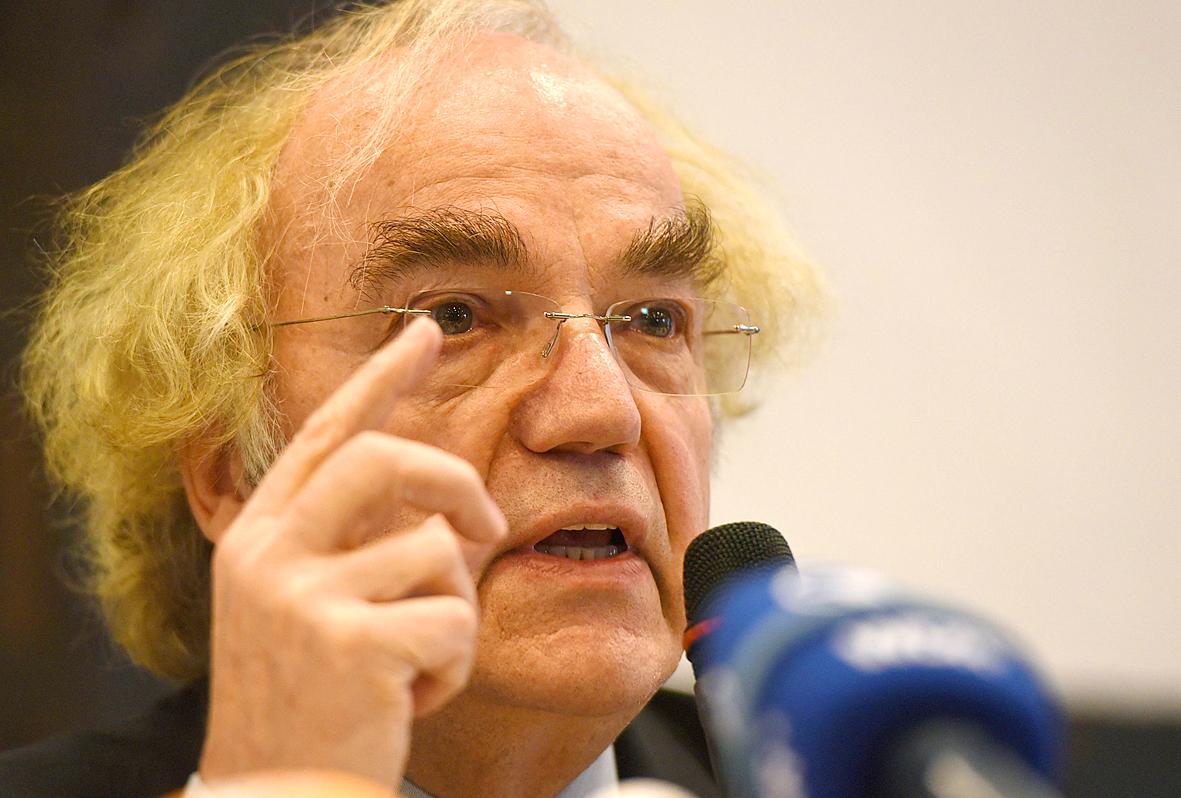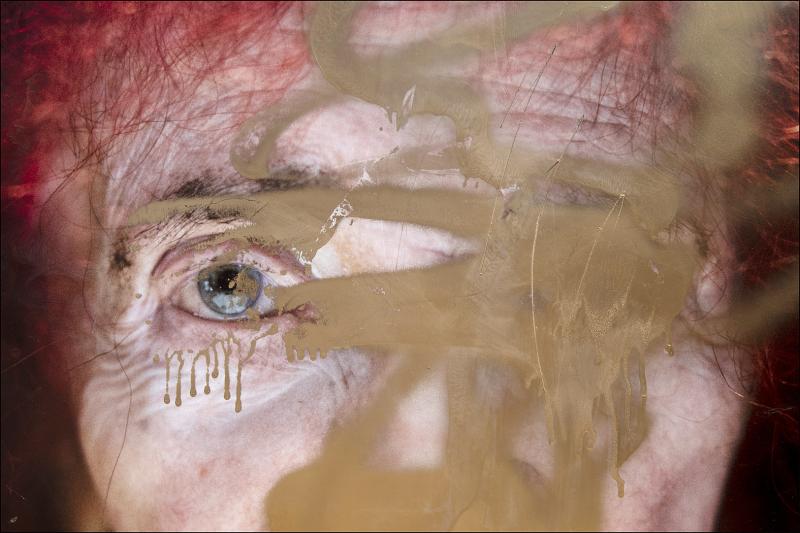Lawyer Thomas Walther, 78, gets prickly when he hears criticism of German courts putting elderly surviving Nazis — many over 90 years old now — on trial.
“No one voices any doubts when charges are filed over a murder after 30 years,” he says.
“But the prosecution of old men and old women is somehow viewed as problematic after 75 years, even if it’s about 1,000 or 5,000 murders in which active assistance was provided by the accused.”

Photo: AFP
Justice has “no expiry date,” stresses the lawyer, who has led the way on a series of twilight justice cases in Germany against the last surviving Nazis.
It was due to a case Walther put before the courts in the early 2000s that jurisprudence was set in 2011, allowing investigators to prosecute Nazi staff on the basis they had served as part of Adolf Hitler’s extermination machine.
Another of his cases will today be reaching the court.

Photo: AP
The trial of Josef S, now 100 years old, accused of complicity in the murder of 3,518 prisoners between 1942 and 1945 at Sachsenhausen concentration camp will open. Walther is representing survivors of the horrors and their relatives.
The long-term prosecutor and later judge has dedicated his retirement years to bringing justice, even if late, to victims of the Holocaust and their descendants.
Besides “the relatives of those killed, countless families that have been completely wiped out too have the right to this late justice”, he says.
DETERRENCE
Located about 30km north of Berlin, the Sachsenhausen camp held 200,000 detainees between 1936 and 1945, mainly opposition figures, Jews and gays.
Tens of thousands of inmates died from forced labor, murder, medical experiments, hunger or disease before the camp was liberated by Soviet troops, according to the Sachsenhausen Memorial and Museum.
The accused, who lives in Brandenburg, has refused to make public comments about the trial. Aged 21 in 1942, he was a chief corporal at the camp.
“The higher ranked officers have died... only those of lower ranks can theoretically still be alive today” and brought to justice, says Walther.
The German lawyer collects witness accounts from across the world that have helped to launch these last proceedings.
In the 2000s, while he was still a magistrate, he put forward the file that led to the 2011 conviction of John Demjanjuk, 90, a former guard at Sobibor camp.
Since then, courts have handed down several guilty verdicts on the grounds that the defendant served as part of the Nazi killing machine rather than for murders or atrocities directly linked to the individual accused.
In the early years after WWII, there was a general reluctance to pursue former Nazis, many of whom remained in key administrative and judicial positions.
Germans were focused on rebuilding a country in ruins, and many remained in denial about past crimes, dismissing the 1945-49 Nuremberg trials as “victor’s justice”.
“I know all the possible means used by prosecutors and judges 30 or 40 years ago to abandon proceedings or to deliver acquittals on Nazi crimes,” says Walther.
“Such practices have nothing to do with law and justice.”
For Walther, the trials serve as valuable deterrence even today.
“It is always a reminder for the present — there are places and actions one can’t be a part of.”

JUNE 30 to JULY 6 After being routed by the Japanese in the bloody battle of Baguashan (八卦山), Hsu Hsiang (徐驤) and a handful of surviving Hakka fighters sped toward Tainan. There, he would meet with Liu Yung-fu (劉永福), leader of the Black Flag Army who had assumed control of the resisting Republic of Formosa after its president and vice-president fled to China. Hsu, who had been fighting non-stop for over two months from Taoyuan to Changhua, was reportedly injured and exhausted. As the story goes, Liu advised that Hsu take shelter in China to recover and regroup, but Hsu steadfastly

Taiwan’s politics is mystifying to many foreign observers. Gosh, that is strange, considering just how logical and straightforward it all is. Let us take a step back and review. Thanks to the Chinese Nationalist Party (KMT) and the Taiwan People’s Party (TPP), starting this year people will once again have Christmas Day off work. In 2002, the Scrooges in the Democratic Progressive Party (DPP) said “bah, humbug” to that. The holiday is not actually Christmas, but rather Constitution Day, celebrating the enactment of the Constitution of the Republic of China (ROC) on December 25, 1947. The DPP and the then pan-blue dominated legislature

Focus Taiwan reported last week that government figures showed unemployment in Taiwan is at historic lows: “The local unemployment rate fell 0.02 percentage points from a month earlier to 3.30 percent in May, the lowest level for the month in 25 years.” Historical lows in joblessness occurred earlier this year as well. The context? Labor shortages. The National Development Council (NDC) expects that Taiwan will be short 400,000 workers by 2030, now just five years away. The depth of the labor crisis is masked by the hundreds of thousands of migrant workers which the economy absolutely depends on, and the

If you’ve lately been feeling that the “Jurassic Park” franchise has jumped an even more ancient creature — the shark — hold off any thoughts of extinction. Judging from the latest entry, there’s still life in this old dino series. Jurassic World Rebirth captures the awe and majesty of the overgrown lizards that’s been lacking for so many of the movies, which became just an endless cat-and-mouse in the dark between scared humans against T-Rexes or raptors. Jurassic World Rebirth lets in the daylight. Credit goes to screenwriter David Koepp, who penned the original Jurassic Park, and director Gareth Edwards, who knows